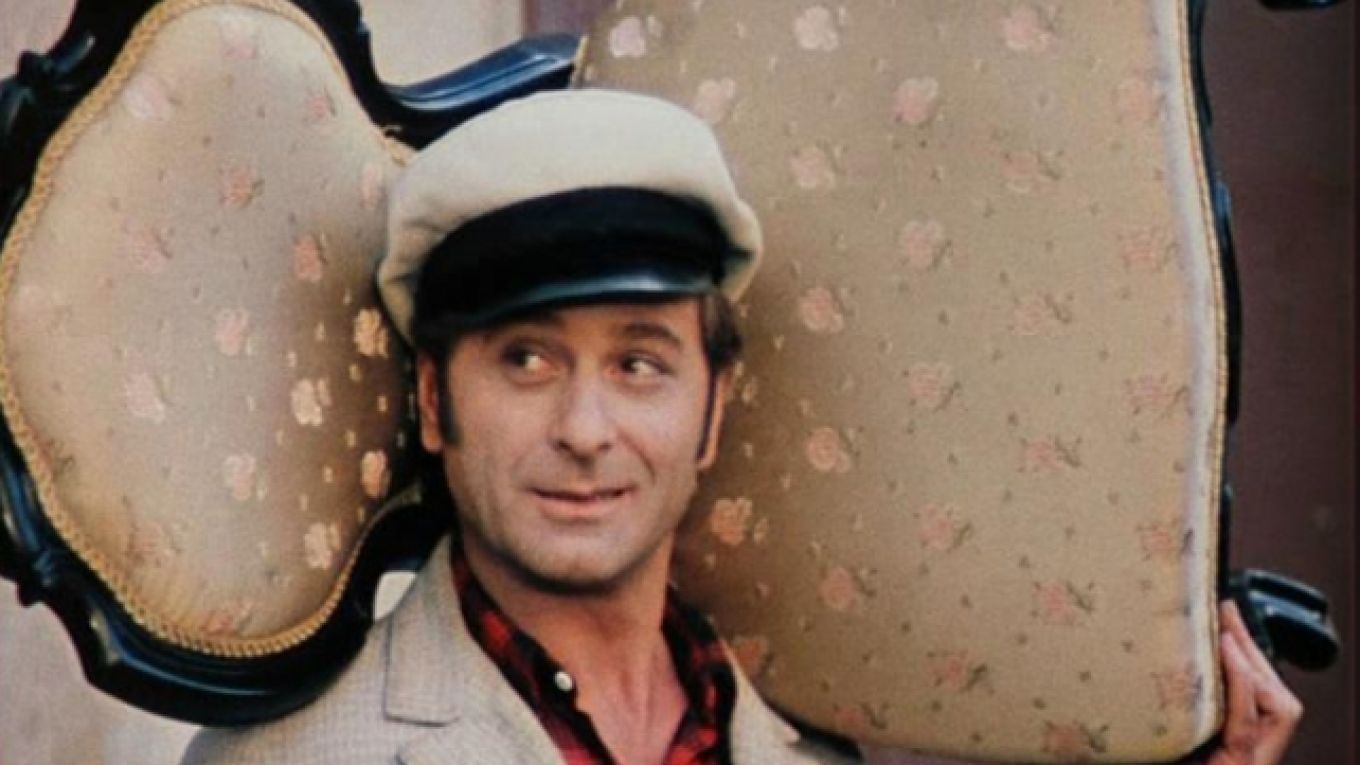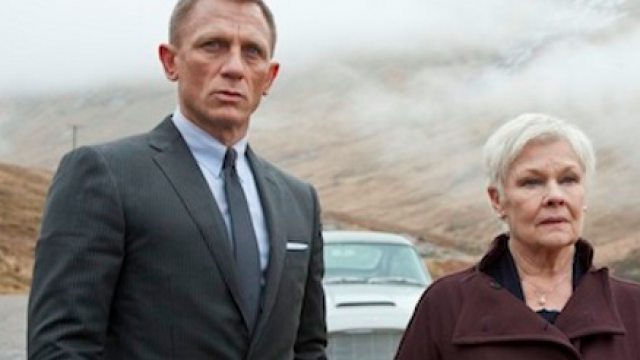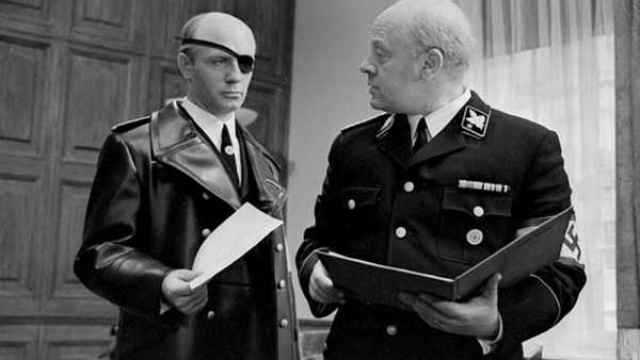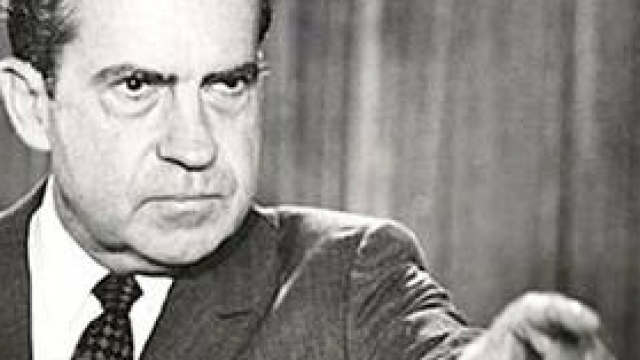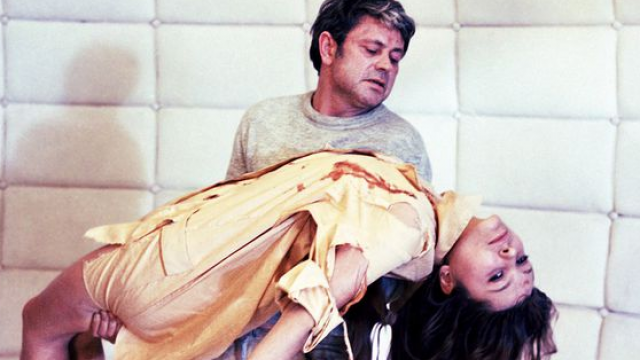It’s Solve That Social Problem! week on Moscow TV, as the small screen offers viewers a half-dozen films that answer key societal questions pondered by Russians in authority — and outside it — for much of the past century: What should we do with citizens who don’t (or won’t) fit into our new society? What decides who’s really Russian? Are self-serving bureaucrats bad by nature or do they acquire their badness only with years of practice? Here’s your where and when:
If you found yourself moved by or simply curious about yesterday’s observance of Russia’s annual Day of Remembrance for the Victims of Political Repressions, Kultura offers a documentary late Monday night that you definitely want to watch. Marina Goldovskaya’s “The Solovetsky Regime: Testimony and Documents” (1988) is an award-winning account from the Perestroika era of the Solovetsky Special Purpose Prison Camp in Russia’s far north. The penal colony was set up in 1921 and effectively served as the point of origin for the entire Soviet prison camp system — the infamous cross-country “chain” of camps dubbed “The Gulag Archipelago” by Alexander Solzhenitsyn. Goldovskaya skillfully combines documentary evidence, rare film footage from the 1920s and 30s and interviews with former camp prisoners — including Academician Dmitry Likhachev — to describe with clear-eyed empathy the origins and development of a great human tragedy that the nation still lives with.
The Solovetsky Regime: Testimony and Documents Власть соловецкая. Свидетельства и документы. Kultura, Monday at 11:50 p.m.
What makes someone Russian? It sounds like a straightforward concept, but one criterion many would use to denote Russianness — “being born in Russia” — is not necessarily definitive. That is one of several telling points made by Yury Malyugin’s fine documentary “Gleb Plaksin: The Resistance of a Russian Frenchman" (2010) on Kultura Tuesday night. Plaksin was born in France in 1925, the son of Russians who left Moscow in the “first wave” of emigration after 1917. From his early childhood onward his parents instilled in him a strong sense of both identity and locus which Plaskin carried with him through life in Europe as a concert pianist and then a French Resistance fighter during World War II. In 1955, at length, he emigrated to the Soviet Union, where he became an award-winning actor and television producer. But he also became, as he recalls for Malyugin, a “split personality”: he was a Russian in Russia, but found out, once “home,” that there was also a Frenchman in him who would not disappear.
Plaksin’s life-narrative makes both a fascinating story and a cautionary tale for Russians contemplating joining the country’s growing “fifth wave” of new-millennium departures: just who are you after you go? And do you really get to decide?
Gleb Plaksin: The Resistance of a Russian Frenchman Глеб Плаксин. Сопротивление русского француза. Kultura, Tuesday at 10:00 p.m.
Stanislav Govorukhin’s “Not By Bread Alone” (2005) was drawn from the eponymous Vladimir Dudintsev novel of 1956, a story of individual, creative Good against collectivist, bureaucratic Bad – an alignment of forces that made the book controversial in the Soviet Union and a sensation abroad. The novel’s inventor-hero had by himself perfected a pipe-casting machine that would revolutionize the Soviet chemical production industry, yet he failed to foresee that the people who ran this industry might not want it revolutionized. What bureaucrats are best at, after all, is gaming whatever system is in place to their own best advantage.
Govorukhin’s film actually makes a better movie than Dudintsev’s novel does a book, not least because the director wisely deploys the dynamic and always watchable Viktor Sukhorukov as the bureaucratic villain-in-chief Drozdov, a rotter the audience loves to hate. The film won festival prizes in Vyborg and Minsk, and will give you, in the end, a good example of the level of resistance to Soviet norms that the post-Stalin era would allow its fictional heroes. It turned out the Thaw could tolerate a rebellious inventor, but not an apolitical doctor (named Zhivago).
Not By Bread Alone Не хлебом единым. TV XXI, Wednesday at 10:00 a.m. (part 1) and Thursday at 10:00 a.m. (part 2)
The Soviet Union wasn’t a very funny place, but it did produce some excellent satire, as “Odessa school” masters Ilya Ilf and Evgeny Petrov demonstrated more than once. On Thursday evening Dom Kino does everyone in need of a laugh – which in Moscow is everyone – a favor by airing the film versions of Ilf and Petrov’s two hallmark satirical novels in the order the books appeared: “The Twelve Chairs” (directed by Leonid Gaidai, 1971) and Mikhail Shveitser’s “The Little Golden Calf” (1968).
The novels were immediately and enormously popular among Soviet readers when they appeared in 1928 and 1931, and one is right to wonder why movie versions of them, as prospective sure-fire hits, took the Soviet film industry 43 and 37 years to produce. The answer may be that the novels were simply so clever on so many levels that screenwriters and directors were intimidated by them. Or it may be that studios felt the close-to-the-bone satire of early Soviet reality and the un-Soviet character of the novels’ beloved “great schemer” hero, Ostap Bender, meant that censors were almost bound to hold up any successful translation of the books onto celluloid. Whatever delayed them, the movies did indeed prove to be worthy adaptations – not as great as the classic novels are in their own genre, but good and diverting fun well delivered by two great casts.
The Twelve Chairs Двенадцать стульев. Dom Kino, Thursday at 7:00 p.m.
The Little Golden Calf Золотой телёнок. Dom Kino, Thursday at 9:55 p.m.
A case for restoring the statue of Felix Dzerzhinsky to Lubyanka Square is sometimes made by people who say that the Soviet Union’s first secret police chief deserves a monument for the success of his vast orphanage construction project. A case against returning the statue to its perch is made by others who point out that it was Iron Felix who created the orphans in the first place. If this seems oversimplified, the fact is that early Soviet society did indeed have a huge homeless orphans problem, and Gennady Poloka’s popular feature “The Republic of SHKID” (1966) was very successful at illustrating it for mid-Soviet-era audiences two generations later.
SHKID is the acronym of the Dostoevsky School, a Petrograd instructional orphanage into which street kids were herded for tutoring in life skills and basic academic subjects by a sympathetic staff. Sergei Yursky is fine indeed as the school’s idiosyncratic principal, but the real stars are the reformed-delinquent kids themselves – Soviet versions of Dennis the Menace writ larger. This film won several awards, did very good box office and remains much loved by today’s Russian public, who give it an impressive 8.2/10 rating on the KinoPoisk site – where Felix Dzerzhinsky might not poll much over 5, statue or no statue.
The Republic of SHKID Республика ШКИД. Friday on Kultura at 10:35 a.m.
A Message from The Moscow Times:
Dear readers,
We are facing unprecedented challenges. Russia's Prosecutor General's Office has designated The Moscow Times as an "undesirable" organization, criminalizing our work and putting our staff at risk of prosecution. This follows our earlier unjust labeling as a "foreign agent."
These actions are direct attempts to silence independent journalism in Russia. The authorities claim our work "discredits the decisions of the Russian leadership." We see things differently: we strive to provide accurate, unbiased reporting on Russia.
We, the journalists of The Moscow Times, refuse to be silenced. But to continue our work, we need your help.
Your support, no matter how small, makes a world of difference. If you can, please support us monthly starting from just $2. It's quick to set up, and every contribution makes a significant impact.
By supporting The Moscow Times, you're defending open, independent journalism in the face of repression. Thank you for standing with us.
Remind me later.



